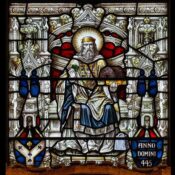My mother died this past summer, so we’re sailing into the holidays absent our commodore. For the 63 years my parents were married, my mother let my father think he was in charge, though we all knew she steered the ship of state, both deftly and demurely.
It’s an odd feeling to imagine Christmas without Mom. She did much of the holiday’s obvious work, plus a hundred other little things we’ll likely forget in the holiday rush. I fear no one will remember to buy a flannel shirt for a down-on-his-luck man in our town, and have it gift-wrapped and under the tree, awaiting his arrival on Christmas Eve. He’s spent Christmas Eve with our family for nearly 40 years, and I don’t want the ball to drop on my watch, so I’ve written in the December 12 square of our refrigerator calendar, “Buy Dale a shirt.” Mom would never forgive us if Dale had to go without a new shirt this Christmas.
When I was little, maybe five or six, my mother took me to Danner’s five-and-dime on the Danville town square and bought me a little red Christmas elf to go on the tree. A few years later, the elf fell forward onto a hot bulb and rested there, burning his face. Now he’s an elf with a bad sunburn. Even though it was mine, Mom wouldn’t let me take the elf with me when I moved from home, but last year, while taking down the tree, she handed me the elf and told me to take good care of him. I’ve since invested that handing-over with all sorts of meaning — that Mom sensed it would be her last Christmas with us and wanted to make sure the elf was not orphaned. I keep it on the bookshelf next to my desk, its red face shining forth, keeping watch by night.
Mom never wanted anything for Christmas.
“I have everything I need,” she would tell us when we asked her what she wanted. So our gifts to her were always stabs in the dark, wild guesses, graciously received, but seldom used. Crystal vases, pottery, Irish sweaters, tucked away in back closets, while the handmade gifts we gave her as children — plastic birds, woven potholders, paint-by-number pictures — enjoyed an eternal place of prominence. One Christmas, after receiving a royalty check, I bought her a new kitchen stove and she spent the next year trying to pay me for it, slipping money in my pockets when I came to visit.
When I was a kid, I would tell my mother I loved her in the way small children do, spontaneously with great enthusiasm. When I became a teenager, and prone to embarrassment, I ended that practice and didn’t resume it for several decades. Even then, almost up until she passed, I would say it in a silly voice I reserve for endearments, so as not to sound too earnest. The day before she died, Mom took my hand and said, “I love you, Philip. You’ve been a wonderful son.” And for the first time since childhood, I told her I loved her in a normal voice. I wish I hadn’t stopped telling her I loved her when I was a teenager.
I’ve lived long enough to know Hallmark’s depiction of mothers isn’t entirely accurate. Having children doesn’t miraculously instill one with compassion, wisdom, patience, and love. Wouldn’t it be wonderful if one couldn’t sire or bear a child until those qualities were present? If God ever puts me in charge of reproduction, I’m going to do something about that.
But my mother had all those virtues and more, which I didn’t appreciate as a kid, so I would ask her for other presents at Christmastime, not realizing she had already given me the loveliest gifts one person can ever give another.
Philip Gulley is a Quaker pastor and the author of 22 books. See also our feature article about Gulley and his wife in the November/December 2017 issue.
Become a Saturday Evening Post member and enjoy unlimited access. Subscribe now




Comments
This is a beautiful tribute to your mom. May you and your family be comforted by God and may the memories you and your mom created forever remain in your heart.
PhIllip, I am saddened by the death of your Mother. She truly must have been a remarkable woman.